Fire Eye helps Serbia see through virus in a more effective manner
By Li Lei Source:Global Times Published: 2020/4/29 11:18:40
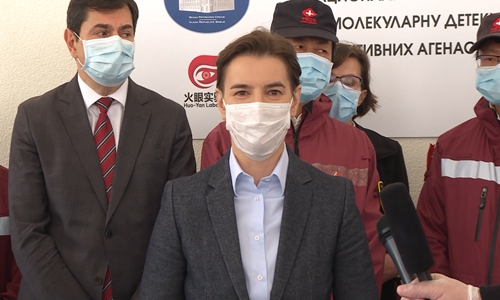
Serbian Prime Minsiter Ana Brnabic speaks at the launch ceremony of Huo-Yan Laboratory in Belgrade. Photo: Courtesy of BGI
China's high-tech giants help the world fight against the COVID-19 pandemic
In addition to medical materials, technology companies keen to support with cut-edge technologies
Projects carried out by Chinese giant companies are highly praised for lending a helping hand
The third Huo-Yan Laboratory (or Fire Eye Lab) was unveiled on April 20 in Belgrade, capital of Serbia, which is the third fully nucleic acid testing lab Beijing Genomics Institute (BGI) constructed in overseas countries. The other two were launched in the UAE and Brunei on March 29 and 30 respectively.
BGI, the world's largest genome research organization based in Shenzhen, South China's Guangdong Province, has been dedicated to increasing nucleic acid testing capability of the novel coronavirus. The company has built 12 Fire Eye Labs in China, and some 40 labs under preparation in more than 10 countries.
"Back to March 6 when the first case was confirmed in Serbia, no more than 100 samples could be processed in the country per day. The Belgrade Huo-Yan Lab completed in Serbia's national clinical center and another lab under construction in Nis, another Serbian city, will increase the number by 3,000," Terence Xiong, leader of the BGI team in Belgrade, told the Global Times.
The name of the laboratory "Huo-Yan", which means "Fire Eye", comes from Chinese mythology: The Monkey King has a pair of Fire Eyes which can see through devils in disguise, said Xiong.
After the construction design was passed, the Serbian side spent less than two weeks to complete the infrastructure of this 750-square-meter laboratory.
The Serbian side attached great importance on the lab. The laboratory project was personally overseen by the Prime Minister of Serbia Ana Brnabić, she appointed her Foreign Policy Advisor to make sure the lab can be erected in the country.
"We were so surprised to see the infrastructure completed in such a short period of time when we arrived in Belgrade. And it only took 12 days from signing the contract to unveiling the lab," Xiong told the Global Times.
Xiong told the Global Times that the core of the lab is the MGISP-960 High-throughput Automated Sample Preparation System, which is a cutting-edge equipment in the world developed by MGI, the manufacturing branch of BGI Group.
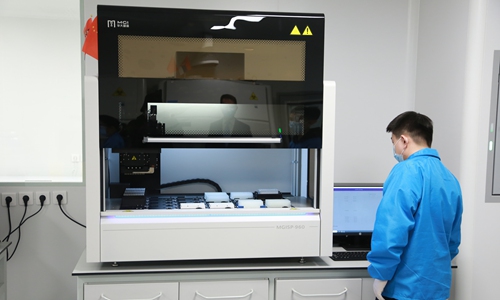
BGI's self-developed MGISP-960 High-throughput Automated Sample Preparation System Photo: Courtesy of BGI
Nucleic acid testing is the most commonly used standard to clinically confirm infected cases of COVID-19, where inadequate lab processing capacity is always a bottleneck to limit the testing speed. In most laboratories, nucleic acid is extracted manually, which is time-consuming and with a higher error rate. "MGISP-960 is like a nucleic acid extraction robot that breaks the throttle of most same-type labs with its large processing capacity, equaling 10 skillful lab operators and with high precision, not mentioning that it can run continuously without rest," said Xiong.
BGI dispatched a six-member team to help build the lab and train Serbian lab operators.
"Five members of my team have participated in the establishment and operation of Fire Eye Laboratory in Wuhan, and familiar with laboratory in design, construction, personnel training and equipment operation. Therefore, they can handle quite well here," said Xiong.
The Serbian team members are from hospitals and institutes of the country's top medicine universities many of whom have a doctoral degree with rich theoretical knowledge. The BGI team will help them in terms of laboratory practice and management.
"Because of the lockdown I was not able to support my hometown in the Wuhan Lab. But today the Serbian people are suffering from the same disease that plagues Wuhan people, and helping Serbian people in this lab is just like I'm doing something for my hometown," said Xiong.
Fire Eye is a biosafety P2 lab, with negative air pressure isolating the lab from the outside. Samples, medical waste and personnel are all entering on entirely different routes to minimize the risk of exposure. Medics send in samples and put them in the collecting chamber, and left. The samples would be then collected by a lab operator through another door in the lab, who will also sanitize the chamber to eliminate possibilities of contamination.
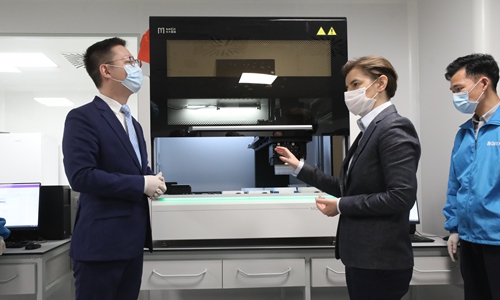
Terence Xiong (left), leader of the BGI team in Belgrade introduces lab equipent to the Serbian Prime Minister Ana Brnabic. Photo: Courtesy of BGI
The samples would be inactivated as the first step in the lab to make the virus not contagious. The second step is to extract nucleic acid from the virus, before entering the third step, the polymerase chain reaction, which shows the result.
"The lab uses a barcode system to mark the samples, easy to track, easy to manage. It's not possible to get confused and mismatched. It is highly appreciated by clinics and gradually will help standardize the whole COVID-19 testing system in Serbia," Xiong told the Global Times.
"Theoretically, the Fire Eye Lab can process a sample in less than five hours," he added, "considering the workflow and continuity, the lab issues results the next day."
The 40-member Serbian team is currently under training in four groups. The communication between the two sides goes smoothly via English - a third party language.
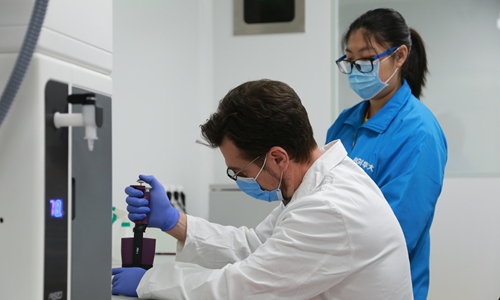
A Chinese lab operator (right) provides training to Serbian lab operators. Photo: Courtesy of BGI
"We have pleasant interaction with our Serbian colleagues, who are friendly and appreciative for China's support," said Xiong.
He shared a story when they first arrived in Serbia. "The Serbian side was very thoughtful that they wanted us to feel less culture shock, so they served us 'Chinese food' every day, which is bread and raw tofu," said Xiong. "It was funny but we could feel that they were doing their best to welcome us."
"Now we have become good friends. We give them Chinese names and teach them some simple Chinese language, and sometimes we would share Chinese green tea, which is warm," he said.
The lab has started running and the Serbian workers are under training, Xiong and his team members have to work late to make sure the lab to step into normal operation soon. They check in at 8 am every morning and leave at 2 am.
"Yes, we are tired physically, but what we do is meaningful and we made friends here," Xiong said.
Dr. Ana Djordjevic, from the Institute for Biological Research of University of Belgrade, told the Global Times that she is impressed not only by the name - Huo Yan and its implication from the Chinese mythology, but also by the lab's streamlined work flow.
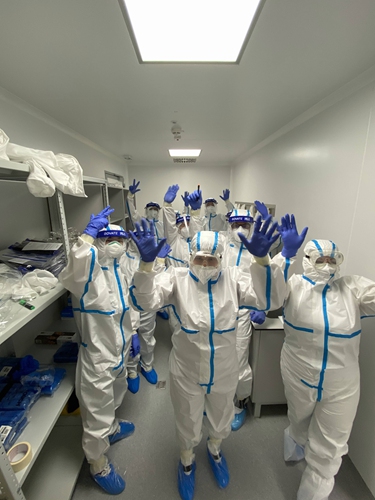
Lab operators pose for a group photo before entering the Lab. Photo: Courtesy of BGI
Dr. Djordjevic is also the leader of the third group Serbian lab operators.
"It is very well organized and when you go into the work flow with large amounts of samples, there is no clogging happened during the process, which is very fine and goes smoothly from the beginning," said Dr. Djordjevic.
She said her first emotional experience was when she received the first batch of real samples from the clinics, "this is the moment when you realized that you are actually doing something useful for the cities and fellows in my country," Dr. Djordjevic told the Global Times.
Serbian Prime Minister Ana Brnabic said at the opening ceremony of the Fire Eye Lab at the national clinic center that in this part of Europe Serbia was one of the leaders in terms of the number of tests analyzed, and that the two new testing facilities, donated by China, would make it one of the top two, local media reported.
Brnabic said the new laboratory was not only a significant aid for Serbia in the fight against coronavirus, but also an important basis for further strengthening the Serbian health system. According to her, after this donation, Serbia will have the best and most up-to-date laboratory in this part of Europe, after fighting the coronavirus.
"Serbia has shown that it has a solid healthcare system, excellent scientists, researchers, engineers, but also great friends, such as China, at times of greatest need," said Brnabic.
Additionally, the operation system and equipment of Fire Eye Lab has been introduced to the US and Sweden.
Newspaper headline: High-tech assistance
Posted in: IN-DEPTH